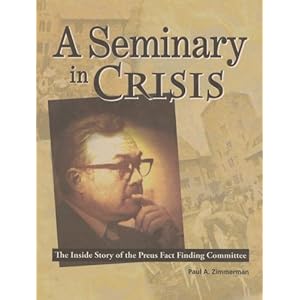My pastor lent me his copy of A Seminary In Crisis: The Inside Story of the Preus Fact Finding Committee by Paul Zimmerman. This book tells of the events that led to the 1974 walkout at Concordia Seminary. I previously reviewed a book by James C. Burkee about the same events. There is surprisingly little overlap between the two books. Zimmerman's book focuses almost exclusively on the theological divisions while Burkee focuses almost exclusively on the political divisions and political maneuvering. Herman Otten takes center stage in Burkee's book but is barely even mentioned in Zimmerman's book. J.A.O. Preus is prominently featured in both books but each book paints a completely different picture of him. In Burkee's book, Preus is the duplicitous, Nixonesque politician. In Zimmerman's book, Preus is the steadfast defender of the true religion. I don't think either Zimmerman or Burkee are being dishonest. They both provide ample evidence to support their portraits of Preus. But they're coming at Preus from completely different angles. Both are necessary to get a full picture both of what happened and who Preus was. There are times that I think Zimmerman may have overlooked some of Preus' faults and I really think that Burkee de-emphasized the theological issues. Zimmerman says that the lay people played a prominent role in ousting the liberals but doesn't provide evidence. Burkee seems to provide a substantial amount of evidence to show that it was mostly clergy that got involved in the controversy.
Zimmerman is very fair to the liberals throughout the book. He regards them as sincere and is quick to point to areas of agreement that he shared with them. He even mentions friendly conversation that occurred during the controversy. He doesn't demonize anyone. He lays out the theological issues in a matter of fact sort of way and shows the different positions held by various faculty members. Less than half of the book is composed by Zimmerman. The vast majority of the book contains primary source documents from the interviews done by the fact finding committee. There is documentation to the point of insanity. I think Zimmerman has done the church a great service by providing this. But if you read through all of it, it gets very redundant. However, I think it's necessary to have it all laid out there. Lots of summaries and transcripts. I found the transcripts to be the most interesting but I wish they had provided names. From reading articles by some of these people, I think I have a pretty good idea who some of them are.
On occasion, I noticed by comparing the reports in the back to what Zimmerman wrote in the front, that it seems Zimmerman takes a more extreme position than the Synod does on some issues. Zimmerman seems to think that professors should be bound to interpret every passage in the exact same way that the confessions do. This does not seem to be the position of the Synod and seems to be an overreaction to those who would argue that "the narrative of the fall of Adam and Eve into sin discussed in the Confessions is not a doctrinal question, but merely an exegetical question that one is free to debate." (p. 50) It seems like there are other ways of dealing with this problem than trying to bind everyone to every interpretation that the Confessions make.
Also, in reaction to professors who denied that passages historically regarded as messianic are actually about Jesus, Zimmerman takes a very extreme rectilinear approach and seems to want to rule out even the idea that the prophecies may in many cases have an initial fulfillment but that they are only fully fulfilled in Christ.
There was some controversy over the term "inerrancy" and I'm not convinced that is was really helpful in the debate. Zimmerman seems to agree with the position of he Synod. But as I have discussed elsewhere, I think it is actually counterproductive once someone starts thinking deeply about it because it puts authority in original autographs that nobody has.
The main controversy seemed to center around two things: the use of the historical-critical method and standards for fellowship. A small number of professors really went off into crazy town with the historical-critical method. The majority did not go off into crazy town but were open to others going off into crazy town and thought that people in crazy town should be open to take communion and even preach in the churches.
If someone wanted a single book to help them understand what the controversy was all about, Zimmerman's book is what I recommend. But they would probably get a fuller picture if they read Burkee's book second.

No comments:
Post a Comment